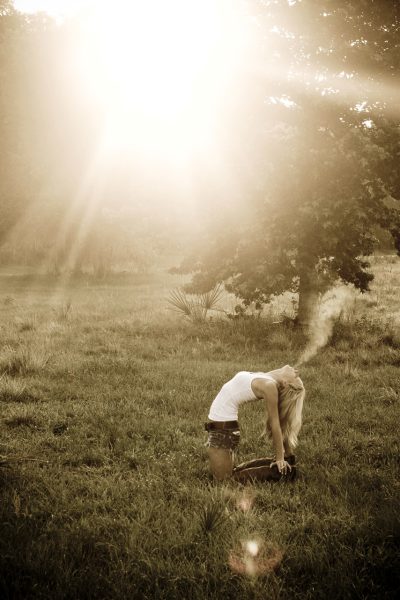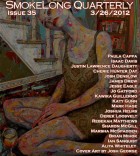This story feels like it has some truth to it. Is it at all autobiographical, or purely fiction?
Quite a bit was drawn from personal experience. I grew up in Michigan where the story takes place and the characters are more or less based on members of my family. For example, my mother is half-Syrian, an excellent cook, and, at least in 1984, very much liked the song “When Doves Cry” by Prince. Also, I have two younger brothers who often wore T-shirts wrapped around their heads like turbans. And my father, who grew up in Detroit, has been a Tiger fan for decades and kept a large backyard garden filled with fruit, vegetables, and herbs. Perhaps the story’s most prominent fictional detail is the father losing his job. My father, who recently retired, was self-employed for forty consecutive years. He worked as a dentist. And the final scene is purely fictional (aside, of course, from Kirk Gibson’s home run and the outcome of the game).
Who is this family? Tell us about the world they’ve come from, and where they are going.
I imagine the parents are second-generation immigrants who grew up in Detroit in the 1950s (a time of prosperity) and 1960s (which ended in the city’s infamous race riots) and moved to a modest Detroit suburb in the early 1970s. And so their sons were born into a world of green lawns, tall maple trees, thick oak trees, deep lakes, public schools, private schools, Catholic schools, rich kids, not-so-rich kids, new money, old money, Middle Eastern immigrants, European immigrants, Russian immigrants, Christians, Jews, churches, synagogues, divorce, racism, sexism, drinking, smoking, drugging, autoworkers, auto executives, lawyers, doctors, teachers, business owners, and housewives. In other words, it’s a multicultural but largely white and conservative middle class world centered around family life.
As for where the family’s going, the mother and father are trying to provide their sons certain privileges (such as easy access to higher education) that their own parents weren’t able to give to them.
This family has adopted The American Pastime as a way to come together and root for a winnable cause. Tell us about how something like a winning baseball season can affect a family and community.
There’s this phenomenon I’ve noticed in New York, where I’ve been living for the past twelve years. It happens the day after a big snowstorm when the city’s covered in a beautiful layer of calming whiteness. People are friendlier than usual, courteous, respectful, helpful, neighborly, not in a hurry to get anywhere or do anything in particular, and, in general, seem to be in a much better mood. This generally lasts for a day, maybe two, until the snow melts into a black and brown slush. In any case, a championship season can be like one long snow day. And I’ve experienced this twice in Detroit: when the Pistons won the NBA championship in 1989 and when the Tigers won the World Series in 1984. In fact, when I think of the Tigers’ ’84 season, I only remember sunny days, as if there wasn’t a cloud in the sky for six months straight. Which, as anyone from Michigan knows, is impossible for six hours straight, let alone six months.
What also comes to mind is how sports can act as a vehicle for connection between men, especially between fathers and sons. That is, when men get together to watch their teams play, talk about their teams, or celebrate their teams’ victories, often they’re expressing love and respect not just for their teams, but for each other. Which they might find difficult to do otherwise.
The Tigers, and by extension baseball itself, are characters in this story, maybe even more than the family members are. Was this a conscious decision, or did it just spring from the story you were wanting to tell? What would happen to this story without the baseball character?
A few years ago I was working on a short story about the no hitter that Detroit Tigers pitcher Jack Morris threw at the beginning of the ’84 season. I was interested in trying to get inside the head of an athlete on his way to a near-perfect game. And I was particularly fascinated with the fact that after a major league pitcher throws four or five no-hit innings, his teammates and managers often won’t talk to him or even look at him. There’s a superstition that, once there’s a good possibility he’ll throw a no hitter, a pitcher is to be left alone. As if he’s gone off to a monastery to take part in a solitary, silent, meditative retreat. In any case, the story fizzled out (embarrassingly I’d entitled it “The Distance” as in “going the distance”). But one day, long after I failed to finish the story, I was thinking about the ’84 season and this very short piece came out in an afternoon. So, to answer, I don’t think it was a conscious decision but perhaps a subconscious one.
As for what would happen to the story without baseball, that’s a good question. And I’m not sure of the answer. Perhaps it would be a much harder one to write without the baseball crutch.
Who do you love to read? Who inspires you?
I absolutely love reading Stuart Dybek, Henry Miller, and Roberto Bolaño. Their writing, even after multiple readings, never fails to inspire me.



 In September 2022 SmokeLong launched a workshop environment/community christened SmokeLong Fitness. This community workshop is happening right now on our dedicated workshop site. If you choose to join us, you will work in a small group of around 15-20 participants to give and receive feedback on flash narratives—one new writing task each week.
In September 2022 SmokeLong launched a workshop environment/community christened SmokeLong Fitness. This community workshop is happening right now on our dedicated workshop site. If you choose to join us, you will work in a small group of around 15-20 participants to give and receive feedback on flash narratives—one new writing task each week.